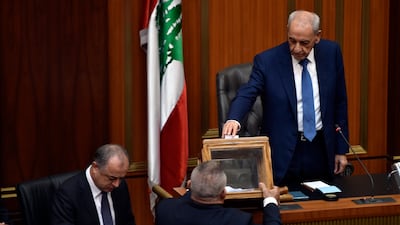Lebanon’s parliament was yet again unsuccessful on Monday in electing a new president.
It was the fourth such attempt, increasing fears that President Michel Aoun’s term on October 31 will end with a presidential vacuum.
Seven days remain until the end of Mr Aoun's term, while no clear successor has emerged.
Parliamentary Speaker Nabih Berri has tentatively scheduled a fifth session of the 128-seat chamber for Thursday, although the date may later change.
A two-thirds vote is needed for a presidential candidate to secure a win in the first round of voting, and an absolute majority is needed in subsequent rounds.
Of 114 votes cast, MP Michel Moawad received 39. He is so far the only frontrunner to have emerged in the race, consistently receiving the most votes out of all candidates but falling short of a majority. Mr Moawad has consistently been outnumbered by blank ballots, of which there were 50 on Monday.
Meanwhile, 13 votes were cast for a ‘New Lebanon’ — a slogan MPs wrote in protest — two were void, and 10 were cast for MP Issam Khalifa, a newcomer to the presidential race. There were two spoiled ballots.
The session ended after several MPs — including those from the Free Patriotic Movement and allied Hezbollah — withdrew from the session following the first round of voting.
MP Alain Aoun of the Free Patriotic Movement said his party, along with the FPM-allied parties of Hezbollah and Amal, would continue to cast blank votes in the absence of a “minimal consensus”.
The usual method of choosing presidential candidates involves consultations between major political parties and blocs.
“If all the groups continue to camp on their positions, we will not be able to reach an agreement,” Mr Aoun said.
Fears that a presidential vacuum will ensue following the expiry of Mr Aoun’s presidency increase with every parliamentary session that ends without success.
Constitutionally, Lebanon’s government will assume the powers of the president if a new head of state is not elected before the end of the sitting president’s term.
But the current government operates in a caretaker capacity, having automatically resigned following the May 15 parliamentary elections five months ago.
With no agreement on a new government in sight, questions of whether a custodial government can take over the presidency have dominated political coverage.
This is the first time a caretaker government could potentially be called upon to fill a presidential vacuum since the end of Lebanon's civil war 32 years ago.

